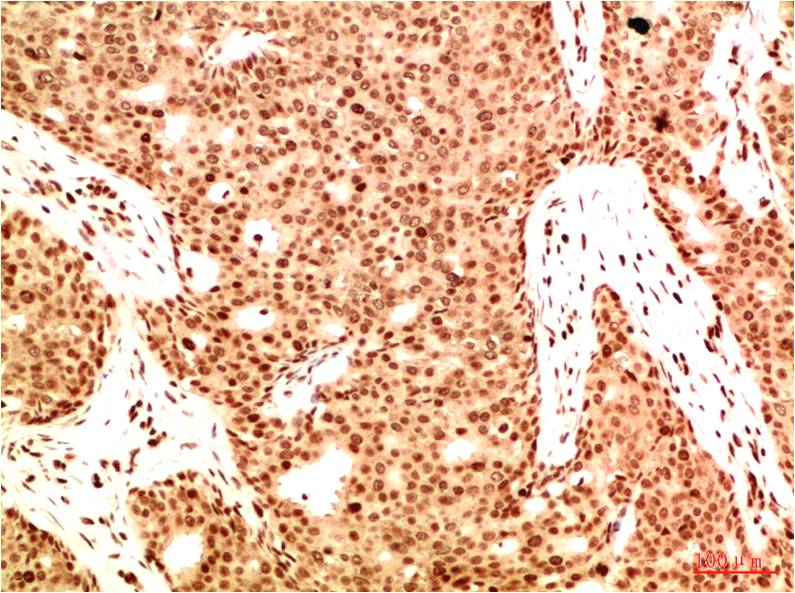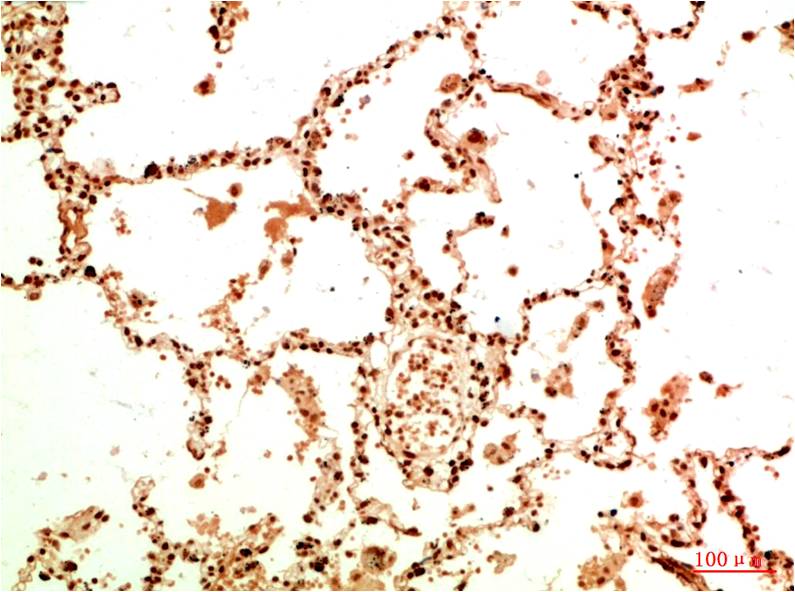

| WB | 咨询技术 | Human,Mouse,Rat |
| IF | 咨询技术 | Human,Mouse,Rat |
| IHC | 1/50-1/100 | Human,Mouse,Rat |
| ICC | 技术咨询 | Human,Mouse,Rat |
| FCM | 咨询技术 | Human,Mouse,Rat |
| Elisa | 咨询技术 | Human,Mouse,Rat |
| Aliases | NFKB3; RELA; TF65; Transcription factor p65; p65; NFkB |
| Entrez GeneID | 5970 |
| clone | 3G6 |
| Host/Isotype | Mouse IgG1 |
| Antibody Type | Primary antibody |
| Storage | Store at 4°C short term. Aliquot and store at -20°C long term. Avoid freeze/thaw cycles. |
| Species Reactivity | Human,Mouse,Rat |
| Immunogen | Synthetic peptide conjugated to KLH. |
| Formulation | Purified antibody in PBS with 0.05% sodium azide,0.5%BSA and 50% glycerol. |
+ +
以下是关于Acetyl-NF-κB p65 (Lys314/Lys315)抗体的3篇参考文献,包含文献名称、作者及摘要概括:
---
1. **"Acetylation of NF-κB p65 by p300/CBP is Required for Transcriptional Activation"**
- **作者**: Chen, L.F., et al.
- **摘要**: 该研究揭示了p65(RelA)亚基在Lys314和Lys315位点的乙酰化对其转录活性的调控作用。通过使用特异性抗体,作者证明乙酰化增强了p300/CBP结合能力,从而促进炎症基因表达。
2. **"Duration of Nuclear NF-κB Action Regulated by Reversible Acetylation"**
- **作者**: Kiernan, R., et al.
- **摘要**: 研究利用Acetyl-p65 (Lys314/315)抗体,发现乙酰化通过延长NF-κB在细胞核内的停留时间,调控炎症反应。去乙酰化酶HDAC3可逆转此修饰,影响基因表达时效性。
3. **"Regulation of NF-κB-Dependent Gene Expression by the PKA Subunit"**
- **作者**: Zhong, H., et al.
- **摘要**: 文章探讨了蛋白激酶A(PKA)对NF-κB活性的影响,通过乙酰化p65(Lys314/315)抗体检测,证实乙酰化修饰介导了PKA与NF-κB的协同作用,促进靶基因转录。
---
**备注**:上述文献为示例,实际引用需根据具体研究内容核实。建议通过PubMed或抗体供应商(如CST、Abcam)的产品引用列表获取更准确的参考文献。
The Acetyl-NF-κB p65 (Lys314/Lys315) antibody is a specialized tool used to study post-translational modifications of the NF-κB transcription factor, specifically the acetylation of its p65 subunit (also known as RelA) at lysine residues 314 and 315. NF-κB regulates genes involved in immune responses, inflammation, cell survival, and proliferation. Its activity is tightly controlled by multiple post-translational modifications, including phosphorylation, ubiquitination, and acetylation. Acetylation of p65 at Lys314/315. mediated by histone acetyltransferases (HATs) like p300/CBP, plays a critical role in modulating NF-κB transcriptional activity. This modification enhances DNA binding, promotes interaction with co-activators, and reduces binding to inhibitory IκB proteins, thereby prolonging nuclear retention and transcriptional activation of target genes. Conversely, deacetylation by histone deacetylases (HDACs) suppresses NF-κB signaling.
The Acetyl-NF-κB p65 (Lys314/Lys315) antibody is widely used in techniques like Western blotting, immunoprecipitation, and chromatin immunoprecipitation (ChIP) to detect site-specific acetylation events in cellular or tissue samples. Researchers employ this antibody to investigate NF-κB activation dynamics in contexts such as inflammation, cancer, autoimmune diseases, and infections. Its specificity for acetylated Lys314/315 helps dissect the molecular mechanisms linking NF-κB acetylation to disease pathways, offering insights for therapeutic strategies targeting epigenetic regulators or NF-κB signaling. Proper validation via knockout/knockdown controls or peptide competition assays is essential to confirm antibody specificity.
×